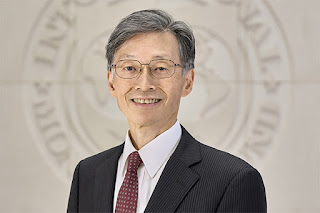Sri Lankan authorities are showing strong commitment to implementing economic reforms, however, the reform momentum must continue amid the challenging economic recovery process, International Monetary Fund (IMF) Deputy Managing Director Kenji Okamura said after concluding his visit to the island nation.
“Sri Lanka’s economy is showing tentative signs of improvement, in part due to the implementation of critical policy actions. But the economic recovery remains challenging. Now, more than ever, it is essential to continue the reform momentum under strong ownership by both the authorities and the Sri Lankan people.”
The IMF-supported economic program aims to achieve macroeconomic stabilization, restore debt sustainability, safeguard financial stability, strengthen governance, and protect the vulnerable.
Okamura thanked Sri Lankan President Ranil Wickremesinghe and other senior government officials, parliamentarians and private sector representatives for having constructive discussions with him, which allowed him to “deepen my understanding of the challenges Sri Lanka is facing and to reiterate the IMF’s commitment to support Sri Lanka’s efforts to surmount these challenges.”
During the discussions, the IMF official said he discussed the importance of fiscal measures, in particular revenue measures, for a return to macroeconomic stability. “I was encouraged by the authorities’ commitment to negotiate a debt strategy in a timely and transparent manner.”
Further, Okamura noted that continued open dialogue with the creditors would help to reach restructuring agreements to restore debt sustainability in line with the program targets. Undoubtably, safeguarding the stability of the financial sector is of utmost importance in this process, he added.
The focus of the talks also fell on the importance of strengthening governance – a central pillar of the economic program. Okamura underscored that the hard-won gains of Sri Lankan people who have relentlessly supported the reform effort can only be safeguarded by good governance.
During the visit to the dock yard, port terminal, and the Colombo port city, Okamura said he was impressed to see continued economic activity which is a testament to the resiliency of the Sri Lankan economy. He emphasized the importance of decisive implementation of structural reforms which can attract investment and boost growth.
“As Sri Lanka navigates its way through the economic crisis, it remains imperative to protect the poor and the most vulnerable that have been disproportionately affected by the crisis. I was heartened to see that the authorities’ have stepped up efforts to increase public spending on social safety nets while improving targeting and coverage for those who need it.”
Recalling the long-standing relations between Sri Lanka and the IMF, Okamura said he looks forward to continued partnership through the EFF-supported economic program.
“Sri Lanka’s economy is showing tentative signs of improvement, in part due to the implementation of critical policy actions. But the economic recovery remains challenging. Now, more than ever, it is essential to continue the reform momentum under strong ownership by both the authorities and the Sri Lankan people.”
Okamura thanked Sri Lankan President Ranil Wickremesinghe and other senior government officials, parliamentarians and private sector representatives for having constructive discussions with him, which allowed him to “deepen my understanding of the challenges Sri Lanka is facing and to reiterate the IMF’s commitment to support Sri Lanka’s efforts to surmount these challenges.”
During the discussions, the IMF official said he discussed the importance of fiscal measures, in particular revenue measures, for a return to macroeconomic stability. “I was encouraged by the authorities’ commitment to negotiate a debt strategy in a timely and transparent manner.”
Further, Okamura noted that continued open dialogue with the creditors would help to reach restructuring agreements to restore debt sustainability in line with the program targets. Undoubtably, safeguarding the stability of the financial sector is of utmost importance in this process, he added.
The focus of the talks also fell on the importance of strengthening governance – a central pillar of the economic program. Okamura underscored that the hard-won gains of Sri Lankan people who have relentlessly supported the reform effort can only be safeguarded by good governance.
During the visit to the dock yard, port terminal, and the Colombo port city, Okamura said he was impressed to see continued economic activity which is a testament to the resiliency of the Sri Lankan economy. He emphasized the importance of decisive implementation of structural reforms which can attract investment and boost growth.
“As Sri Lanka navigates its way through the economic crisis, it remains imperative to protect the poor and the most vulnerable that have been disproportionately affected by the crisis. I was heartened to see that the authorities’ have stepped up efforts to increase public spending on social safety nets while improving targeting and coverage for those who need it.”
Recalling the long-standing relations between Sri Lanka and the IMF, Okamura said he looks forward to continued partnership through the EFF-supported economic program.






0 Comments